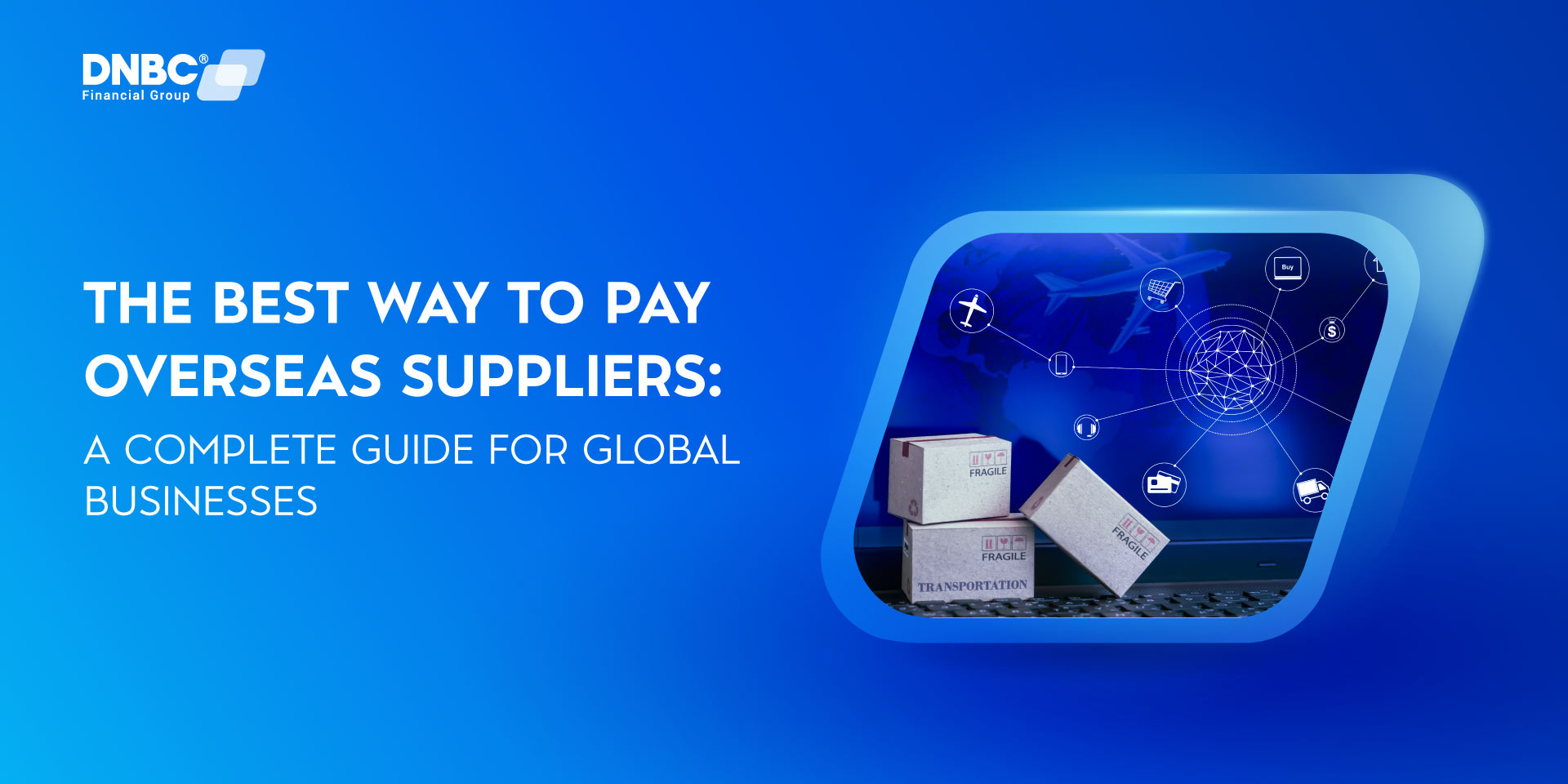- Home
- Blog
- Business Finance
- Navigating international trade challenges with DNBC
Navigating international trade challenges with DNBC
Business Finance
22 February 2024
DNBC Team
This article is a part of DNBCGroup Blog Center
Contact DNBCGroup for the technology news, tips, trends, and updates.
In the global business landscape, international trade is the key to unlocking growth and innovation. By entering new markets, businesses can tap into fresh customer bases and diversify their operations, setting the stage for unprecedented success.
However, venturing into the world of international expansion brings along its unique challenges. They might include navigating complex regulations, cultural differences, managing financial risks, and supply chain challenges.
In this blog, we'll dive into the essentials of international trade, spotlighting both its benefits and the hurdles businesses encounter. More importantly, we'll reveal how DNBC serves as a crucial partner for companies navigating the financial intricacies of cross-border payment.
The importance of international trade in global expansion
International trade stands as a crucial cornerstone for businesses aiming to broaden their horizons globally. It is crucial for several reasons:
Broadening market reach and diversifying income sources
International trade enables businesses to expand their reach globally, connecting with customers beyond their local markets.
Therefore, this expansion is crucial for lessening dependence on the local economy and achieving more consistent income. By exploring different markets, businesses can protect themselves from the ups and downs of their home economy, ensuring continuous growth.

Boosting competitiveness and innovation
Competing on a global stage forces businesses to up their game. In particular, businesses encounter diverse competitors and standards, driving them to adopt the latest technologies, improve efficiency, and innovate.
This effort not only boosts their competitiveness but also fosters an environment where continuous improvement and innovation thrive.
Fostering economic growth
On a broader scale, international trade fosters economic growth by encouraging efficient resource use, boosting productivity, and creating jobs. It allows countries to specialize in sectors where they have a comparative advantage, improving the economy worldwide.

Navigating the challenges of international trade
International trade offers vast growth opportunities but also comes with its own set of challenges.
Regulatory compliance and legal frameworks
One of the biggest challenges in international trade is adhering to the extensive variety of laws and regulations that govern across borders. Every country has its own set of rules regarding tariffs, import and export restrictions, product standards, and intellectual property rights.

Navigating these legal frameworks requires thorough research and often the guidance of legal experts, making compliance a complex and resource-intensive process.
Cultural and language barriers
Cultural differences and language barriers can significantly impact international trade operations. Misunderstandings and miscommunications can lead to conflicts, delays, and potentially failed partnerships.
Hence, businesses must invest in cultural competence, including understanding local business practices, negotiation styles, and communication preferences, to build successful international relationships.
Currency exchange and financial risk
Currency fluctuation is another critical challenge in international trade. Exchange rates can vary widely over time, affecting the cost of transactions, profitability, and financial planning.
To deal with these currency risks, companies must navigate currency risks through strategic financial planning for business expansion. They might include hedging strategies and careful contract wording to minimize exposure to currency devaluation or inflation in foreign markets.
Supply chain complexity and logistics
Managing a supply chain that crosses international borders adds layers of complexity to operations. Logistics issues such as transportation, customs clearance, and warehousing can cause delays and increase costs.

Furthermore, geopolitical tensions or global events can disrupt supply chains. This situation requires thorough backup plans and a flexible strategy for managing the supply chain.
Access to financing and capital
Expanding into international markets often requires significant investment. However, accessing the necessary financing can be challenging, especially for small and medium-sized enterprises (SMEs) with limited collateral.
Financial planning for business expansion is crucial. Businesses may need to explore various funding sources, including loans, venture capital, and government grants designed to support international trade.
Adapting to market conditions
Each international market has its own demand dynamics, competitive landscape, and consumer preferences.
Companies need to tailor their products, marketing approaches, and overall operations to match the specific demands of each local market. This could include changing the design of products, revising pricing models, or embracing different marketing platforms to resonate more effectively with local preferences and expectations.

Managing international payment and transaction costs
For businesses involved in international trade, navigating the financial complexities of cross-border transactions is a significant challenge.
These companies often face substantial fees for currency conversion, international wire transfers, and additional handling charges by banks or financial institutions. Over time, these costs can add up, significantly affecting the profitability of operations on a global scale.
Additionally, the complexity of managing multiple currency accounts and ensuring timely, secure transactions across different banking systems can pose operational challenges.

How DNBC helps overcome international payment challenges
At DNBC, we stand out as a trusted partner for international money transfers. We enable businesses to go global and achieve market expansion more efficiently, minimizing the financial hurdles of overseas payment.
By leveraging DNBC's services, businesses can enjoy the benefits of:
- Multi-Currency Accounts:
DNBC simplifies financial management by enabling businesses to manage multiple currencies within a single account, eliminating the need for numerous accounts and streamlining currency management.
- Streamlined Payment Processing:
DNBC is designed to simplify cross-border transactions, significantly reducing the time and effort required to process international payments.
- Free personalized support:
At DNBC, we offer support tailored to each client's needs. We provide complimentary, expert financial advice, guiding businesses through the intricacies of international finance, and optimizing their strategies for global trade.
Contact DNBC for a free consultation today.
Related Articles:- Cross-Border Business Opportunities and Challenges in the Global Marketplace
- Exploring the Importance and Impact of International Trade Agreements
- How to Get an International Business License
- 5 Effective Ways for Doing Your Business Internationally
- Export and Import Laws Affect International Money Transfer
- Supply Chain Efficiency for Import and Export Operations
Your Trusted Partner
In your Digital
Journey
Free 1 - on -1 support
Free account opening fees
No hidden fees
Note: The content in this article is for general informative purposes only. You should conduct your own research or ask for specialist advice before making any financial decisions. All information in this article is current as of the date of publication, and DNBC Financial Group reserves the right to modify, add, or remove any information. We don’t provide any express or implied representations, warranties, or guarantees regarding the accuracy, completeness, or currency of the content within this publication.
Related posts

A Guide to Low-Cost Business Transfers Outside the SEPA Area
04 July 2025

How to Set Up a Business Escrow Account: A Simple Guide
20 June 2025

Cross-Border Business: Opportunities and Challenges in the Global Marketplace
23 May 2025

The Best Way to Pay Overseas Suppliers: A Complete Guide for Global Businesses
22 May 2025

Real Time Cross Border Payments: Shaping the Future of Global Financial Transactions
22 May 2025